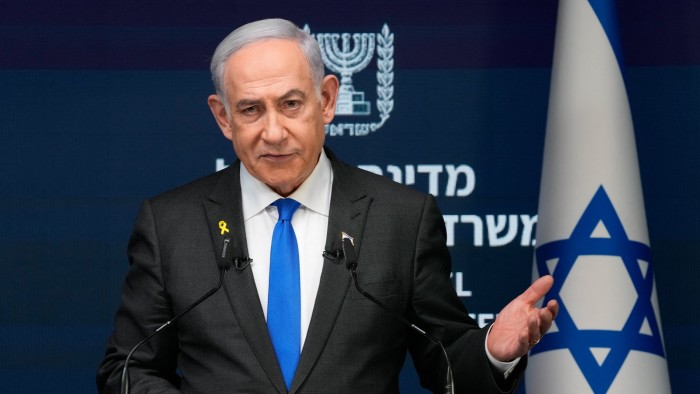Unlock the Editor’s Digest for free
Roula Khalaf, Editor of the FT, selects her favourite stories in this weekly newsletter.
Israeli Prime Minister Benjamin Netanyahu claimed on Sunday that his office was the target of an “organised witch hunt”, amid brewing scandals relating to leaks of classified documents and an alleged attempt to blackmail a military official.
In a statement, Netanyahu said his office was facing a “wild and unbridled attack” from the media designed to “to harm the country’s leadership and weaken us in the middle of war”.
“Suddenly, in recent days, in a timely and orchestrated manner, they are trying to terrorise me and my people, in the midst of a war that I am leading — and they are creating scandals out of thin air,” he said, dismissing media reports about his office as “fake news”.
Netanyahu’s statement came as a number of scandals related to his office made headlines in Israel. One relates to an investigation being carried out by agencies including internal security service Shin Bet into the alleged leaking of classified documents to the foreign media, as part of which a media adviser to Netanyahu and four military personnel were arrested.
The leaks fed in to subsequently debunked media reports about Hamas plans that appeared to support Netanyahu’s contention that the Palestinian militant group, rather than he, was the main obstacle to a deal to free the Israeli hostages it is still holding in Gaza and end the war.
Another case relates to allegations of an attempt to blackmail a military official. Earlier on Sunday, the prime minister’s office published a letter from the lawyers of Netanyahu’s chief of staff, Tzachi Braverman, threatening legal action against Israel’s public broadcaster after it alleged he was suspected of being involved in the attempt.
The letter from Braverman’s lawyers said that “not a word” of the report was true, and that it amounted to “‘fake news’ and serious slander, along with wild incitement during wartime”. Braverman also denied the allegations, describing them as “false” and “defamatory” and “aimed at harming me and the Prime Minister’s Office in the middle of a war”.
In his statement on Sunday, Netanyahu claimed that there had also been a “flood of leaks” from other parts of government — such as the security cabinet and the war cabinet — but that these had not been investigated by law enforcement agencies, even though he had repeatedly requested it.
“They don’t even check. Why? Because the goal is not to protect the security of the state,” Netanyahu said. “The goal is to promote an agenda of weakness and concessions, in the midst of the war.”
The scandal relating to the leaks of classified information came to light earlier this month after a court partially lifted a gag order on them, with the presiding judge saying the leaks could have impaired Israel’s ability to secure the release of the hostages still held by Hamas in Gaza.
The leaks cited documents that claimed Hamas planned to divide Israeli society with propaganda efforts about the hostages. They also suggested the militant group wanted to smuggle the hostages to Egypt via tunnels under the so-called Philadelphi corridor, which separates Gaza from Egypt.
The stories appeared at the end of August and the beginning of September when Netanyahu was under intense pressure from mass street protests to accept a deal to end the war and free the hostages. However, Netanyahu refused to give up control of the Philadelphi corridor, which many regional diplomats believe was a reason the negotiations failed.
The Israeli military briefed reporters after the stories ran saying that the documents were written by a low-level Hamas official, were old and were not indicative of the army’s intelligence on Hamas’s strategy.
Read the full article here




